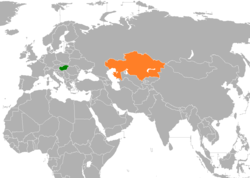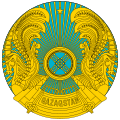 | |
Hungary | Kazakhstan |
|---|---|
Hungarian-Kazakhstan relations are the bilateral relations between Hungary and Kazakhstan. Hungary has an embassy in Astana. Kazakhstan has an embassy in Budapest. Diplomatic relations between the countries were established on 2 April 1992. [1] Due to the shared historical, cultural, and linguistic traits, the country became one of the most important socio-economic partners of Hungary.[ citation needed ]

